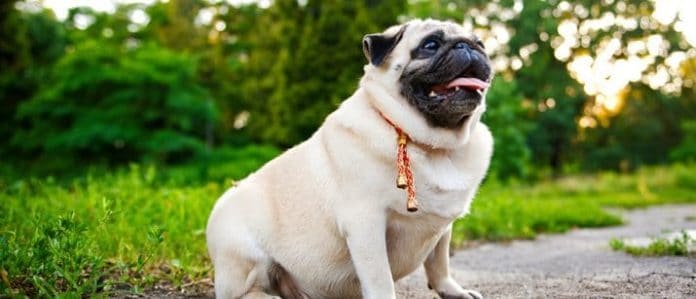Explore the health risks associated with obesity in dogs and offer some useful tips for improving your dog’s health and wellbeing.
According to a survey conducted by Association for Pet Obesity Prevention in 2016, around 54% of dogs in the US and in Canada, 1 in 3 dogs in the UK are carrying too much weight. Although there are medical reasons for weight gain in dogs, most overweight animals just eat more calories than they use up.
CAUSES OF OBESITY IN DOGS
A 2010 survey of veterinarians in Australia revealed that, in their view, only 3% of obese dogs had a health condition that contributed to their excess weight. Such conditions include Cushing’s Disease and hypothyroidism. This means that the remaining 97% of overweight canines were overweight because of how their owner looked after them – too much food, too many treats and not enough exercise.
Contrary to popular belief, desexing doesn’t make your dog fat, but it may change his metabolism so he doesn’t need as many calories. Desexing is also usually done at around 6 months of age, when his growth rate is levelling out and his energy needs are reducing.
HEALTH RISKS ASSOCIATED WITH OBESITY
Your overweight dog is at risk of a number of conditions that can make life less than enjoyable for him.
- Arthritis. If his joints have to carry a lot of weight, then they are subject to more wear and tear. This can lead to degeneration of the cartilage and painful arthritis.
- Breathing difficulties. It’s not easy for your dog to breathe when there is a layer of fat surrounding his chest.
- Dogs with diabetes and heart disease are more difficult to manage with medication if they are obese.
Even if your dog doesn’t suffer from any of these conditions, it has been shown that if his food intake is restricted throughout his life, he is likely to live longer.
IS YOUR DOG OBESE?
It’s not always easy to look at your dog and get a good idea of his body condition. Some dogs have thick coats that make it hard to see what’s underneath. This is why you need to use your hands as well as your eyes to tell if your dog is carrying too much weight.
Look at your dog from the side and from above. You should see an obvious waistline just after his ribs. If it isn’t there, if your dog’s body is essentially rectangular, then he needs to lose weight.
Move your hands over your dog’s chest and feel his ribs. If you can find them fairly easily, this indicates that he is in good condition. If you can’t feel his ribs at all, then there is work to be done.
HOW TO HELP YOUR DOG LOSE WEIGHT
Your dog’s obesity is most likely to be because he is eating too much and not exercising enough, so it should be fairly easy to help him lose the excess weight. Just feed him less and walk him more, right… It’s easier said than done.
Here are some suggestions to guide you in dieting your dog.
- Feed your dog ‘to condition’. This means that you should only use the feeding guide on his packet of food as a suggestion. If he is gaining weight, feed him less, until you can see his waistline and feel his ribs.
- If your dog has a lot of weight to lose, use a prescription diet food, like Hills R/D or Metabolic. This will allow him to reduce his calorie intake while still getting enough of the other nutrients he needs.
- No more between-meal treats or bedtime snacks, unless it is a healthy option. Offer your dog some steamed green beans or small cubes of cooked pumpkin as treats.
- Your whole family must be on board. There’s no point in you working hard to make your dog trim if another person is sneaking him snacks.
- Harden your heart to those soft pleading eyes. Trade a treat for a massage, a brush or a game of ball in the back yard. There are other ways of showing your dog how much you care that don’t involve food.
Obesity is a preventable condition that has many adverse effects on your dog’s health. If your canine best friend is carrying a few extra kilos, put him on a diet. He’ll enjoy a better quality of life, for longer.









